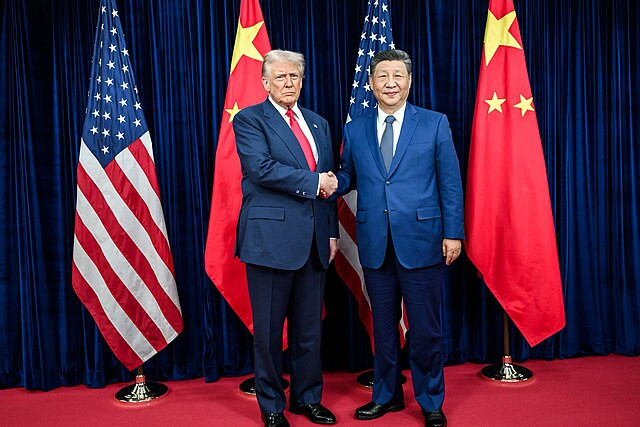President Donald Trump and Chinese President Xi Jinping announced a limited trade truce Thursday following a high-stakes meeting in Busan, South Korea, marking a rare moment of détente between the world's two largest economies after months of tariff escalations and export restrictions.
Speaking aboard Air Force One, Trump said he would slash tariffs on China imposed earlier this year as punishment for Beijing's sale of fentanyl-related chemicals, cutting the rate from 20% to 10%. The decision effectively lowers the overall tariff burden on Chinese goods to 47%. "I guess on the scale from 0 to 10, with ten being the best, I would say the meeting was a 12," Trump said. "I think it was a 12."
China, for its part, agreed to resume the export of rare earth elements and purchase significant quantities of U.S. agricultural products. According to Treasury Secretary Scott Bessent, Beijing will buy 25 million metric tons of American soybeans annually over the next three years, beginning with 12 million metric tons between now and January. "Our great soybean farmers, who the Chinese used as political pawns, that's off the table," Bessent told Fox Business Network.
Xi framed the agreement as a turning point, telling Trump the two nations must "focus on the benefits of cooperation rather than falling into a vicious cycle of mutual retaliation." He said both sides would work to finalize agreements that provide "peace of mind to both countries and the rest of the world," according to Chinese state media.
The truce includes a one-year suspension of China's rare earth export restrictions, which had sparked fears of global supply chain disruptions. Trump told reporters the deal would be "very routinely extended as time goes by," signaling optimism that both sides could maintain the arrangement beyond 2025. The U.S. also agreed to delay the implementation of a rule blacklisting Chinese companies' subsidiaries from trade access, according to Beijing's Ministry of Commerce.
Trump and Xi's 100-minute meeting followed days of groundwork laid by officials in Kuala Lumpur, where both sides reached what U.S. Treasury Secretary Bessent described as "a very successful framework." Ahead of the talks, U.S. officials indicated that Trump had no plans to impose the additional 100% tariffs he had threatened earlier in October. In return, China signaled readiness to ease rare earth export limits and restart large-scale soybean imports.
The meeting took place in modest surroundings-a gray building with a blue roof on a South Korean military base near Busan's airport-rather than the lavish venues that typically host international summits. Trump later described the session as a "G2 meeting," emphasizing the economic weight of the two nations.
Despite the breakthrough, key issues remain unresolved. Trump said he and Xi discussed potential exports of Nvidia computer chips to China but noted that talks over the most advanced Blackwell GPUs would be left to Nvidia CEO Jensen Huang and Chinese negotiators. "I said that's really between you and Nvidia, but we're sort of the arbitrator," Trump remarked.
The White House said it is also exploring energy trade deals, with Energy Secretary Chris Wright and Interior Secretary Doug Burgum set to meet Chinese counterparts to discuss potential oil and gas purchases from Alaska. Meanwhile, China's Ministry of Commerce stated that both sides would "resolve issues related to TikTok," though neither Trump nor Xi elaborated on the details.
For markets, the Busan meeting signaled a short-term de-escalation of tensions that had rattled investors since October, when China tightened rare earth exports and Washington threatened steep retaliatory tariffs. "Both sides are managing volatility, calibrating just enough cooperation to avert crisis while the deeper rivalry endures," said Craig Singleton, senior director of the China program at the Foundation for Defense of Democracies.
Trump plans to visit Beijing in April, while Xi is expected to travel to the U.S. later in the year for further talks, either in Palm Beach, Florida, or Washington, D.C. Officials from both governments described the outcome as a pragmatic pause rather than a permanent resolution.





